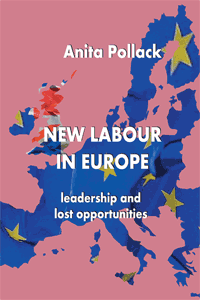
"New Labour in Europe: Leadership and Lost Opportunities"
Book summary
PART I : Before 1997
This first part of the book covers Labour's poor showing in the first European Parliament direct elections in 1979 through to the election of the Labour government in 1997, tracing the complete change of Labour's European policy. There is also a brief look at the period before direct elections.
During the first decade of the elected European Parliament Labour was reluctant about membership of the European Community. The Labour group was led by the formidable anti-market former Cabinet Minister Barbara Castle, for whom I worked. Under the party leadership of Neil Kinnock Labour's policy was gradually but firmly changed and the party modernised.
From a poor start, at each European Parliament election the Labour contingent grew until it became the largest group from the UK at the 1989 election, followed by a landslide victory in 1994.
PART II: 1997 - 2001
Tony Blair's New Labour government, elected by a landslide in 1997, was full of enthusiasm for the European project and committed to joining the single currency "when the time was right". Holding the Presidency of the European Council shortly after its election, the government signed up to the social chapter in the Amsterdam Treaty and was instrumental in negotiating the St Malo declaration on defence policy in 1998. But the rigours of life in the spotlight of government and the need to ensure continuing electoral popularity in the face of the Eurosceptic British press meant that initial enthusiasm for the EU and for the single currency began to fade.
The system in the UK for elections to the European Parliament was completely changed from the old constituency-based first past the post method to one of proportional representation under a closed regional list. Labour then lost a substantial number of its MEPs in the 1999 European Parliament elections.
PART III: 2001 - 2005
After winning a second election in 2001 Blair built a close relationship with the Republican US President, George W Bush. He launched "Europe: the Third Way" with Germany's Chancellor Gerhard Schröder and led the push for economic liberalisation in what became known as the Lisbon agenda. Europe ministers were frequently changed.
Socialists were no longer the majority group in the European Parliament and the flow of progressive social legislation in the EU largely dried up. The euro took off without Britain and the feud between Brown and Blair went long-haul. Neil Kinnock's two terms as a European Commissioner came to an end and he was replaced by Peter Mandelson.
Then the world changed with the attack on the World Trade Centre in New York in September 2001. When Blair led the country to war in Iraq his premiership took a battering and at the 2004 European Parliament elections Labour took the punishment.
During this period important events included the European Constitutional Convention and the enlargement "Big Bang" which opened the UK border to a wave of central and Eastern European immigrants. There were battles over EU budgets, the working time directive and services of general interests, but the prevailing impetus was the "fight against terrorism".
PART IV: 2005 - 2010
An historic third term Labour government was elected in May 2005 albeit with a reduced majority but the fractious relationship between Brown and Blair became all-consuming. Britain held another successful European Presidency. Blair eventually called it a day as prime minister in June 2007.
The Constitutional Treaty was rejected in a referendum in France and the Netherlands, leading eventually to a slimmed down Lisbon Treaty instead, signed in December 2007, on which Labour decided not to hold a referendum after all. Europe ministers continued to be changed on a regular basis.
Blair continued to annoy the socialists by continuing to co-operate closely with centre-right governments in Spain and Italy. Reviewing his time as prime minister he acknowledged he had been disappointed at his government's failure to join the euro and that the public had still not been drawn into the European project.
Brown had a successful beginning to his term as prime minister but opinion turned against him after the botched decision in the autumn of 2007 not to hold a general election. He recalled Mandelson from Brussels in 2008 to help out at home and replaced him with Baroness Catherine Ashton as the European Commissioner for Trade.
Towards the end the Labour government was suffering in popularity as the economy was hit by the world-wide economic crisis. At home MP's expenses scandals dominated and Labour's team of MEPs was further depleted in the 2009 European Parliament elections at which two BNP MEPs were elected.
After 12 years of a Labour government that had promised to put Britain at the heart of Europe the British public remained less than enthusiastic about membership of the EU.
PART V: Afterword - Post 2010
This part briefly looks at the coalition government in Britain from 2010 - 15 and the rise of the term "Brexit" - the possibility of a British exit from the EU. Under prime minister David Cameron the British Conservative group left the influential European People's Party in the European Parliament and formed a political grouping with Eurosceptic MEPs further to the right.
In contrast, Ed Miliband's Labour Party vocally supported EU membership and in the 2014 European Parliament elections Labour was for the first time since 1999 able to increase its number of MEPs.
The Conservative promise of a referendum on the EU was part of their election manifesto in 2010 and again in 2015. The other "European" theme that rose to the surface was that of immigration from the EU.
The New Labour government of 1997 - 2010 was genuine in its support for the EU but failed to keep its eye on the ball and never engaged in a battle to win British hearts and minds. In the face of an impending in/out referendum, the risk of "Brexit" remains real.
